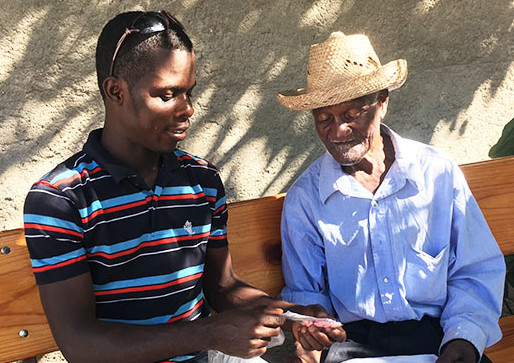 Libonet was sitting on the bench in the hallway of the annex at the Clinic of Hope. Next to him sat a volunteer and a patient who had been seen by the visiting eye surgeon. Libonet was using the English he learned at the school in Terre Blanche to translate instructions from the volunteer to the patient. This scene was repeated throughout the week that the March medical team was at the clinic.
Libonet was sitting on the bench in the hallway of the annex at the Clinic of Hope. Next to him sat a volunteer and a patient who had been seen by the visiting eye surgeon. Libonet was using the English he learned at the school in Terre Blanche to translate instructions from the volunteer to the patient. This scene was repeated throughout the week that the March medical team was at the clinic.
Each medical team that works at the clinic is joined by dozens of Haitian workers, including translators who come from a nearby city. But Libonet, 25 years old, has a different story. He graduated from the school in Terre Blanche and was the first former student to spend a week working with a volunteer team.
Always with a smile on his face, Libonet was first assigned to manage the many people coming in and out of the clinic annex door. But he quickly became more than a “guard.” He willingly helped with translations, moving benches, and assisting patients and medical staff.
Libonet grew up in Dubedou with two brothers and three sisters. His parents still live in Dubedou, a village not far from Terre Blanche, and Libonet sometimes stays there. Dubedou only has a primary school so he attended secondary school in Terre Blanche.
Libonet has plans to continue school and eventually study at a university. One day he hopes to become a doctor. “This is my dream,” he said during a break in the clinic activity.
For the past five years, Libonet has been a “colvol.” These are community health volunteers who work in their own communities, providing education and assistance to neighbors, friends and family. Libonet volunteers in Dubedou, the village where he grew up.
The work of the covols is “very, very important,” Libonet said. “The covols serve many people.”
He went on to tell the story of a child who was sick with pneumonia. Libonet referred the child and family to the Clinic of Hope, where the child was treated and eventually recovered. Without the assistance of a community health volunteer, the child’s future was uncertain.
Libonet also distributes Medika Mamba, a fortified peanut butter given to malnourished children who are monitored as they grow.
“When I see a child who has malnutrition, that program can help,” he said. “So it is a good program. It helps many, many children.”
Taking advantage of other opportunities, Libonet has installed a drip irrigation system for his garden, where he harvests fruits and vegetables.
The care that Libonet has for his community is obvious to those around him. He is just one of the young people who make us look at the future with hope. There are many more.








 Instagram Feed
Instagram Feed
